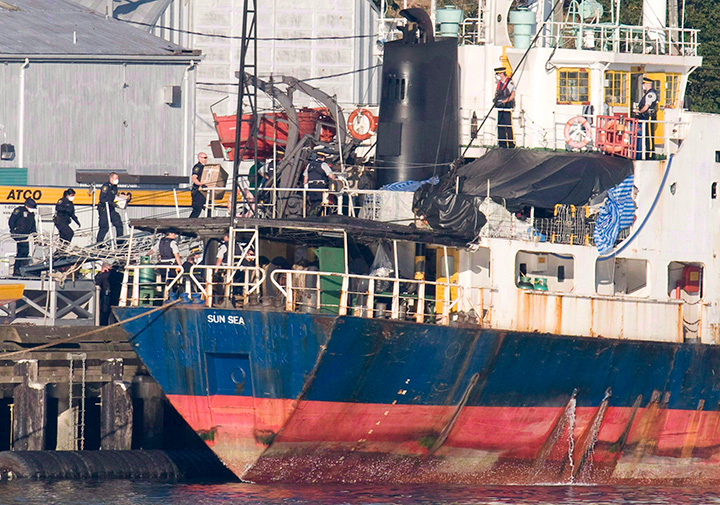OTTAWA – People who helped undocumented migrants enter Canada by steering a ship, acting as a lookout or cooking meals cannot automatically be branded as human smugglers, the Supreme Court of Canada says.

In a pair of unanimous judgments Friday, the high court effectively ruled that acts of humanitarian assistance or aid between family members do not amount to people smuggling under Canada’s immigration law.
Refugee and civil liberties groups welcomed the court’s pronouncement.
“In the midst of the Syrian refugee crisis, when Canadians are acutely aware of refugees’ need for protection, these decisions are particularly timely,” said the Canadian Council for Refugees.
READ MORE: Supreme Court of Canada to hear arguments on ‘human smuggling’ cases
In one judgment, the court ruled in favour of four Tamils from strife-torn Sri Lanka who arrived in British Columbia in 2010 aboard the MV Sun Sea, a rickety boat carrying 492 passengers.
The organizers of the voyage promised passage to Canada for payments ranging from $20,000 to $30,000 a person, but the Thai crew abandoned the ship shortly after departure.
While aboard, three men involved in the case – whose identities are not public – performed routine tasks such as meal preparation, navigation and working in the engine room.
The court says the three are entitled to new refugee hearings after initially being declared inadmissible to Canada for engaging in people smuggling. One man’s wife – who was declared ineligible as an accompanying family member – has since been admitted to Canada as a refugee, making her appeal in the case moot.
The men can escape being barred from Canada under the relevant provision of the Immigration and Refugee Protection Act “if they merely aided in the illegal entry of other refugees or asylum-seekers in the course of their collective flight to safety,” Supreme Court Chief Justice Beverley McLachlin said in her reasons for judgment.
The ruling also applies to the case of Jesus Rodriguez Hernandez, who was granted asylum in the United States in 2001 after fleeing Cuba. Two years later he was convicted of alien smuggling for trying to ferry a boatload of Cubans to the U.S.
Following release from prison, Hernandez made a refugee claim in Canada but was found inadmissible due to involvement in human smuggling. Hernandez was also denied haven in Canada on grounds of serious criminality – something the high court ruling does not change.
In a second ruling, the Supreme Court ordered new trials for four individuals who were criminally charged with people smuggling after arriving off the coast of Vancouver in 2009 aboard the MV Ocean Lady, which carried 76 Tamil migrants.
The Crown had alleged that the four – Francis Anthonimuthu Appulonappa, Hamalraj Handasamy, Jeyachandran Kanagarajah and Vignarajah Thevarajah – organized the voyage and served as the captain and chief crew members.
The Supreme Court said the provision of the Immigration and Refugee Protection Act under which they were charged – which made it an offence to “organize, induce, aid or abet” the arrival of people in contravention of the act – was unconstitutional and overly broad.
The Crown’s interpretation of the provision would mean “a father offering a blanket to a shivering child, or friends sharing food aboard a migrant vessel, could be subject to prosecution,” said the judgment, also penned by McLachlin.
The court found the interpretation incompatible with the refugee-protection goals of the federal immigration law.
The British Columbia Civil Liberties Association, an intervener in the case, applauded the ruling.
“There are many aspects of Canadian refugee law that need fixing and today the court has just fixed just one of them – finding it’s unconstitutional to turn people who help refugees into criminals,” said Laura Track, staff lawyer at the association.
“That’s an important victory.”



Comments